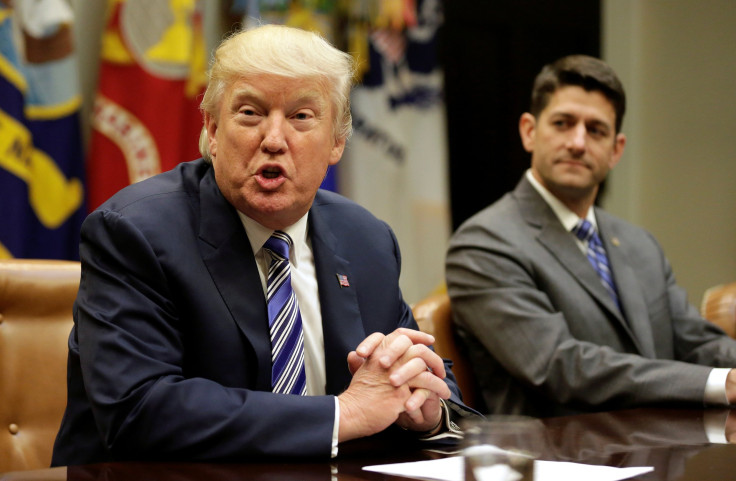Trump Health Care Tax Cut Could Lead To Layoffs, Not New Jobs

Republicans pushing new tax cuts in the American Health Care Act say the proposal is intended to boost revenues for medical technology companies, which would help them create American jobs. However, data from the past three years -- as well as corporate financial filings — suggest that the windfall could instead effectively subsidize offshoring and layoffs in the industry.
Senate Republicans have been working behind closed doors on a new version of the AHCA, which is a top Trump administration priority. The House bill includes a full repeal of the medical-device tax first imposed by Obamacare in January 2013. The tax was suspended — with bipartisan support — three years later.
The tax is due to resume next year, however, and lawmakers in both parties say permanent repeal will help medical technology companies hire more workers. But some companies already appear to be using the suspension windfall to help pay for the steep, one-time severance costs of eliminating U.S. jobs as part of long-term cost-cutting or “restructuring.”
Read: Trump Health Care Plans Would Give Wealthy GOP Lawmakers A Tax Break
In public statements and corporate filings reviewed by TYT Politics, more than half a dozen major med tech companies — including some global leaders — show no sign of ramping up U.S. hiring. In fact, soon after the tax was suspended, some companies embarked on wholesale “restructuring” efforts. Some are pouring money into the creation of new jobs outside the U.S., including manufacturing jobs.
Most of the major med tech companies contacted by TYT Politics did not respond to questions. The two companies that did respond touted their recent investments.
“Rather than spending hundreds of thousands of dollars on the tax, which was based on sales rather than profits, we have substantially increased our investment in developing innovative devices that help children all over the world,” said a spokesperson for OrthoPediatrics.
Read: Suspension of Tax Hasn't Prompted These Med-Tech Companies To Start Hiring
A Medtronic spokesperson told TYT Politics that “More than 500 new jobs have been added in Minnesota since January 2015. While these numbers may fluctuate...the company is on track to meeting this commitment (creating 1,000 jobs in Minnesota) over a 5-year period.”
AdvaMed, the Advanced Medical Technology Association, initially predicted that the tax would kill 43,000 industry jobs, then estimated that it actually did kill almost 29,000 jobs, and now claims that permanent repeal will save or create 53,000 jobs. The industry advocacy group is run by former Bush administration Health and Human Services Chief of Staff Scott Whitaker and has been lobbying for the tax cut under the leadership of Chief Advocacy Officer J.C. Scott, a former congressional staffer who worked for Republican lawmakers including Deborah Pryce and Joe Scarborough.
Independent analyses have found no significant job losses from 2013 through 2015, and almost universally report that the industry grew during the three years the tax was implemented. In 2014, EP Vantage, which covers the med-tech industry, reported “stable” employment. Earlier this year, EP Vantage found “ little impact from the medical device tax on employment in the sector.”
In 2015, the Congressional Research Service estimated minimal negative impacts on employment due to the medical device tax. Similar conclusions were reached the same year by Consumers Union and last year by Ernst & Young.

Some companies that eliminated jobs in anticipation of the tax ended up hiring again soon afterward. Minnesota-based St. Jude Medical, for instance, laid off six percent of its 16,000 workers in anticipation of the tax. By the summer of 2014, St. Jude had expanded its workforce by seven percent, back to its 2012 levels.
In February 2014, the Indiana pediatric device-maker OrthoPediatrics told The Daily Caller that it instituted a hiring freeze due to the medical-device tax. The company’s CEO, however, assured the Daily Caller that OrthoPediatrics was in no danger and was growing at a rate of 40% a year at the time. According to company documents, the OrthoPediatrics headcount grew from 46 employees in 2010 to 69 at the end of 2015.
(Last December, Reuters quoted the OrthoPediatrics CEO claiming that the suspension had let him expand his workforce. However, in the company’s IPO filing six months earlier, it listed just 58 employees, down from the 69 it reported at the end of 2015.)
Job Cuts Follow Suspension Of Device Tax
In an email, EP Vantage medtech reporter Elizabeth Cairns told TYT Politics, “There are so many other factors that can lead to a company expanding or reducing its headcount it is all but impossible to argue cause and effect.”
Industry executives, however, frequently do just that — blaming taxes for layoffs and crediting tax cuts for job creation. In a survey six months after the tax was gone, 69 percent of the med tech executives polled said they were likely to invest that extra money in U.S. jobs.
And some companies have stuck with changes they blamed on the tax. Georgia-based Theragenics said it would lay off 139 of its 534 workers and offshore some manufacturing, partially due to the tax. Purchased in 2013 by a private firm, Theragenics then decided to scale back its offshoring, but did end up creating 50 new jobs in Costa Rica while eliminating 139 in Texas and 88 in Oregon.
Four days after the suspension took effect, Theragenics purchased a U.S.-Canadian company and said it would be manufacturing in Georgia.
But Theragenics appears to be one of a handful of exceptions. There are no signs the tax windfall is being put to wholesale job creation. Asked whether any companies have announced they actually will create new U.S. jobs if the tax is repealed, Cairns said, “Not to my knowledge. Companies tend to shy away from making definitive statements like this.”
Since winning the tax suspension in December 2015, several companies — including global giants Johnson & Johnson, Medtronic, and Stryker — have announced U.S. job cuts:
- Jan. 19, 2016: New Jersey-based Johnson & Johnson unveiled a restructuring plan “including approximately $500 million of employee severance” to cut its medical-devices division workforce by as much as six percent, eliminating 3000 jobs worldwide.
- June 2016: Boston Scientific announced its own “restructuring” and “targeted headcount reductions.”
- October 2016: Baxter International of Illinois revealed it had allocated $144 million to pay for layoffs.
- December 2016: Stryker shut a South Carolina factory supporting 88 full- and part-time jobs.
- December 2016: Medtronic announced Twin Cities job cuts.
- March 2017: Fifty Stryker layoffs were reported by local media in the company’s home state of Michigan.
- February 2017: Indiana’s Zimmer Biomet said it will trim its U.S. workforce by up to one percent.
- May 2017: Medtronic confirmed Memphis job cuts
- May 2017: Ohio-based Invacare announced announced 50 North American layoffs.
“It Will Get This Repeal”
Financial filings reveal other payroll changes that suggest the tax windfall is not fueling a boom in U.S. hiring. Invacare was cited by Whitaker in an op-ed last year as a company that would benefit from repeal. Its annual reports, however, show that the company went from employing 4,700 people in 2015 to 4,600 people last year, prior to last month’s additional 50 layoffs.
Boston Scientific — an AdvaMed member and vocal opponent of the tax — said last March that the tax windfall would enable it to double the headcount of its collaboration with the Mayo Clinic. The company’s overall headcount did, in fact, rise last year—up to 27,000, from 25,000 in 2015.
However, the Boston Business Journal reported that the entire 2000-job increase was accounted for by overseas hiring, as Boston Scientific boosted its non-U.S. payroll from 12,000 to 14,000. A Boston Scientific spokesperson told the newspaper that the company’s addition of “several hundred” U.S. workers last year wasn’t reflected in its U.S. numbers because the company rounded down.
Despite the U.S. job cuts, many companies are expanding — primarily by acquiring other companies, or adding to their non-U.S. workforce.
“There’s always an argument for companies to shift their workforce from the US to a place where wages are lower, assuming they can get the same level of expertise,” Cairns wrote. “But the US government, particularly with a president with protectionist instincts, would presumably do what it can to avoid this — if repealing the tax would provide companies with the cash to relocate, the government might be expected to avoid repeal. That said, the current leadership is committed to tax reform, so maybe they would be willing to repeal the tax even if it did prompt medtech companies to cut their U.S. workforce.”
The industry is pushing back on recent suggestions from some Republicans that they might forego repealing the tax — in order to subsidize some Obamacare provisions they want to keep. The tax was projected to generate approximately $29 billion over ten years to subsidize health care.
Whitaker, the AdvaMed president, told MassDevice.com he is confident the tax will be repealed one way or another, thanks to Democratic support. A 2014 bill to repeal the tax was cosponsored by several Democrats: Sen. Richard Blumenthal (D-CT), Sen. Robert Casey (D-PA), Sen. Joe Donnelly (D-IN), Sen. Al Franken (D-MN), Sen. Amy Klobuchar (D-MN), and Sen. Jeanne Shaheen (D-NH). Other notable Democrats who have supported repeal include Sen. Elizabeth Warren (D-MA) and Georgia congressional candidate Jon Ossoff.
Even if repeal doesn’t get passed through the AHCA, Whitaker said, “ The fact that we have such broad bipartisan support increases the likelihood that, regardless of the vehicle that Congress moves, it will get this repeal…I’ve been told by everybody, including leadership in the House and the Senate, one way or the other we’ll get it done this year.”
This story was co-published by IBT and TYT Politics.
© Copyright IBTimes 2024. All rights reserved.





















